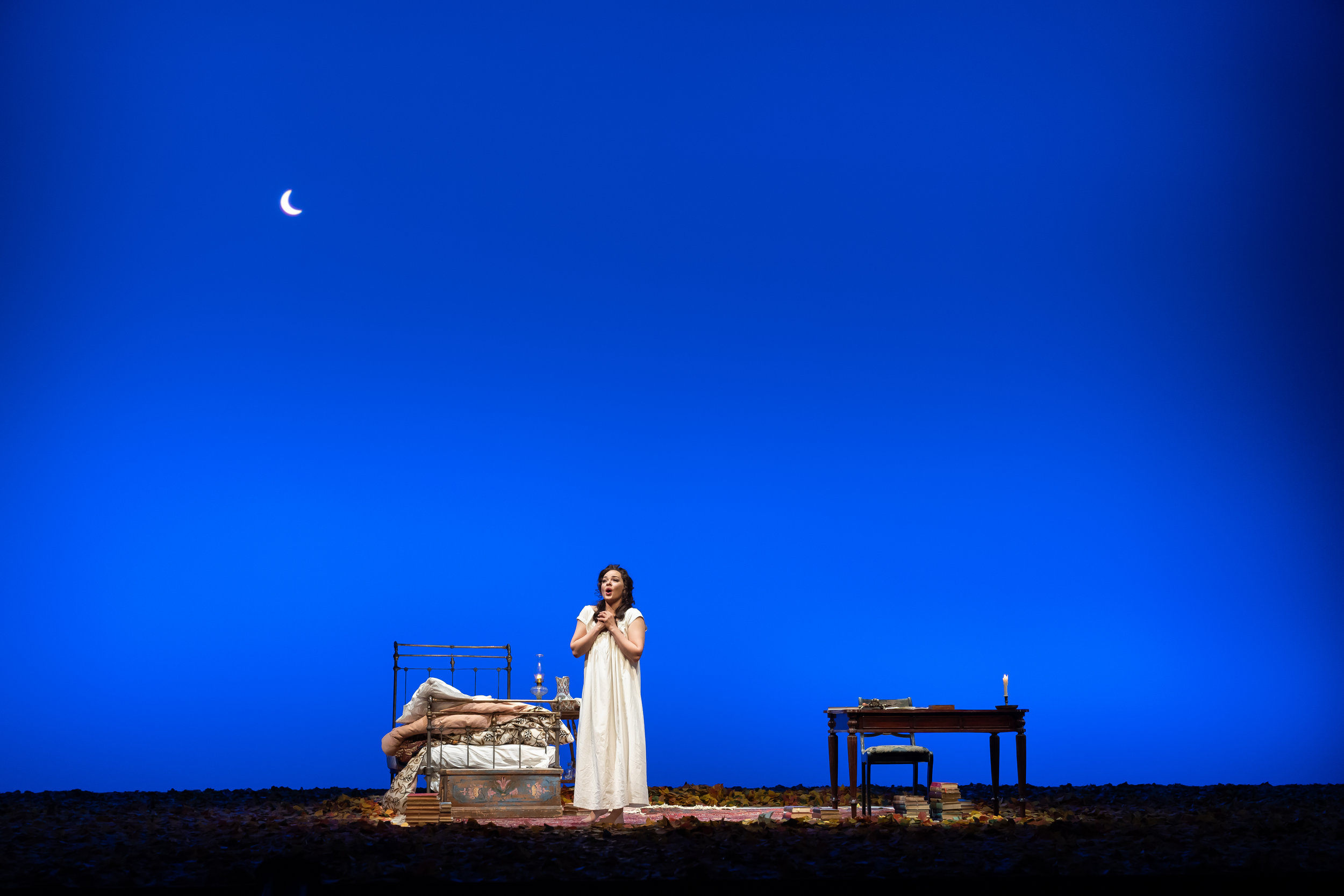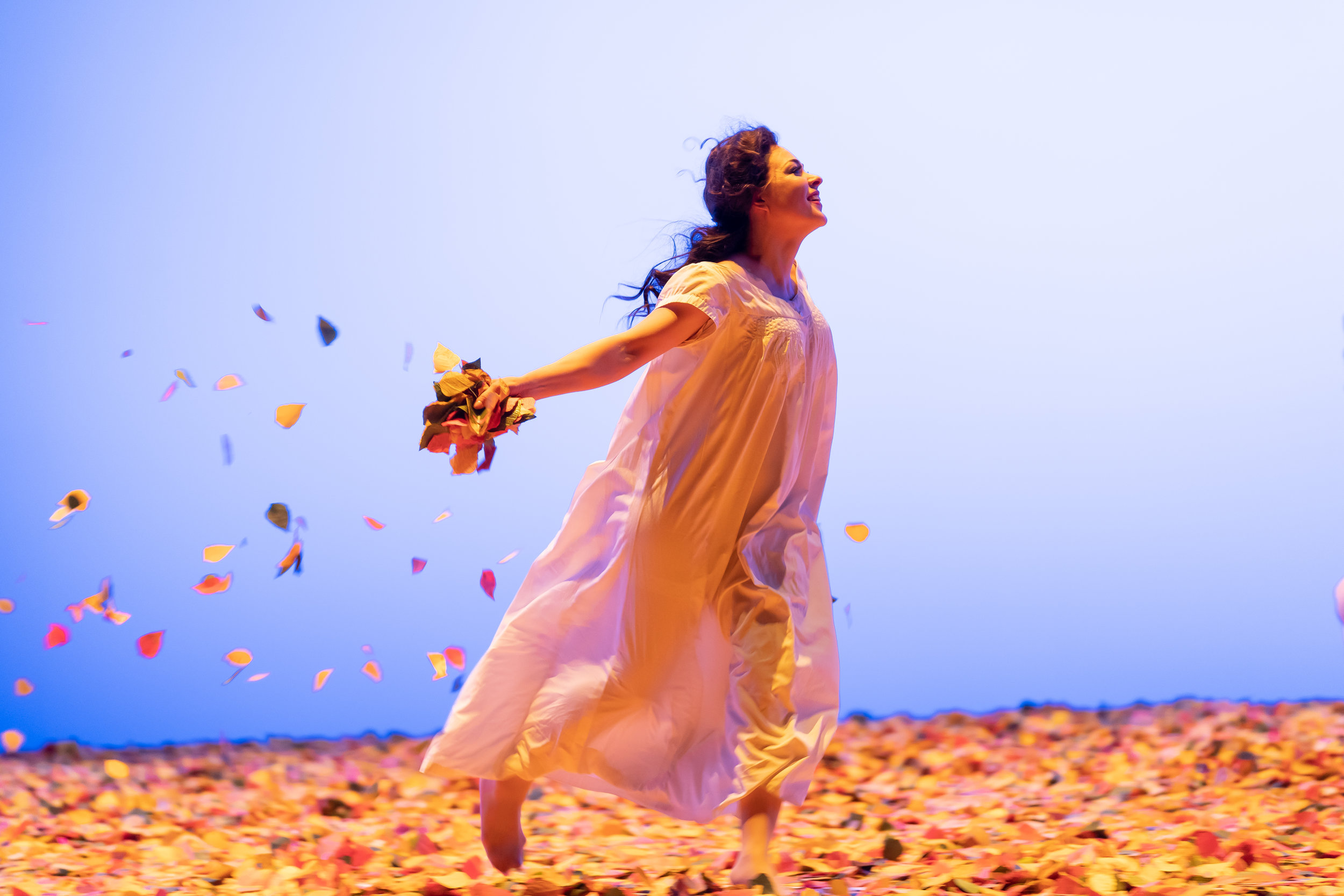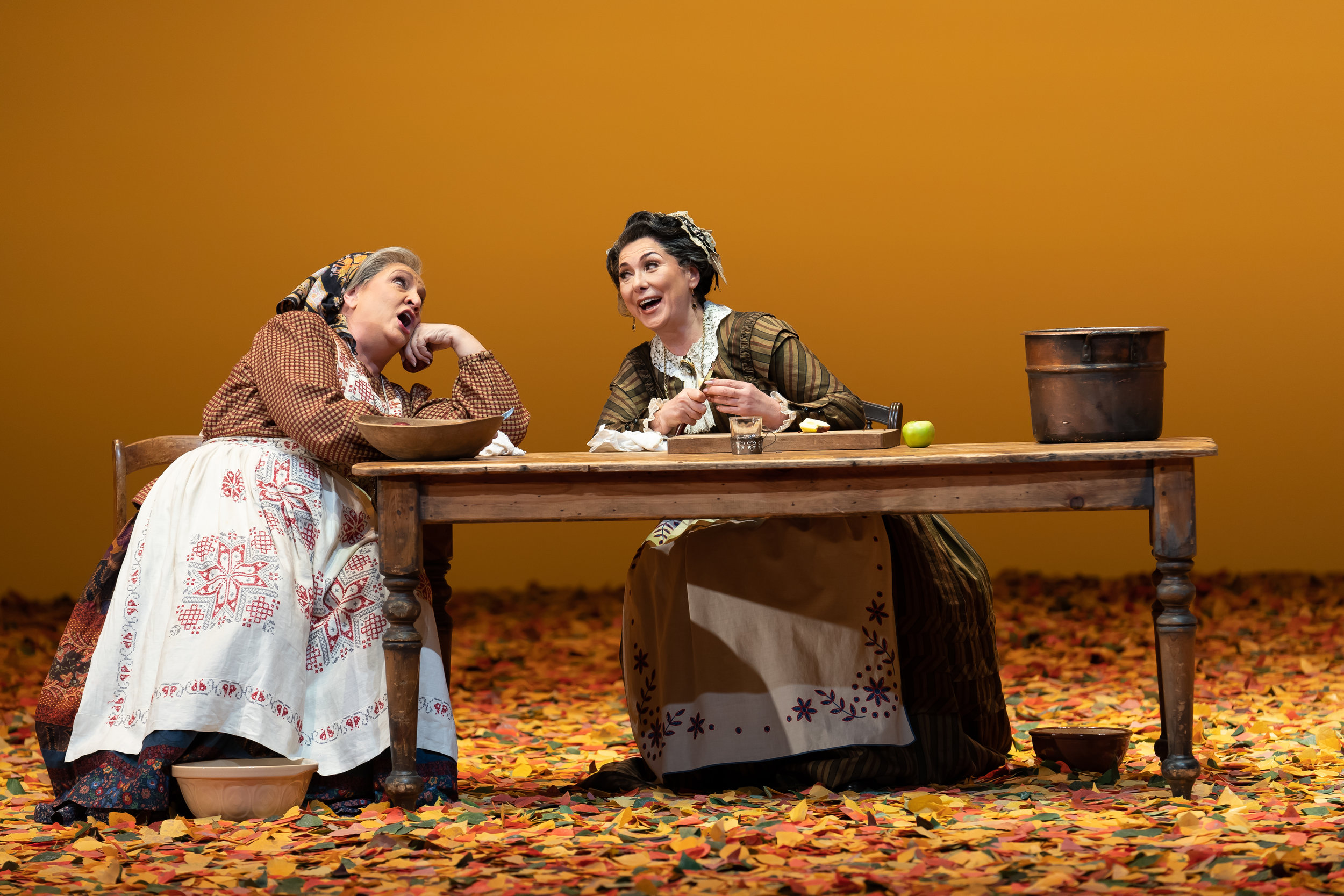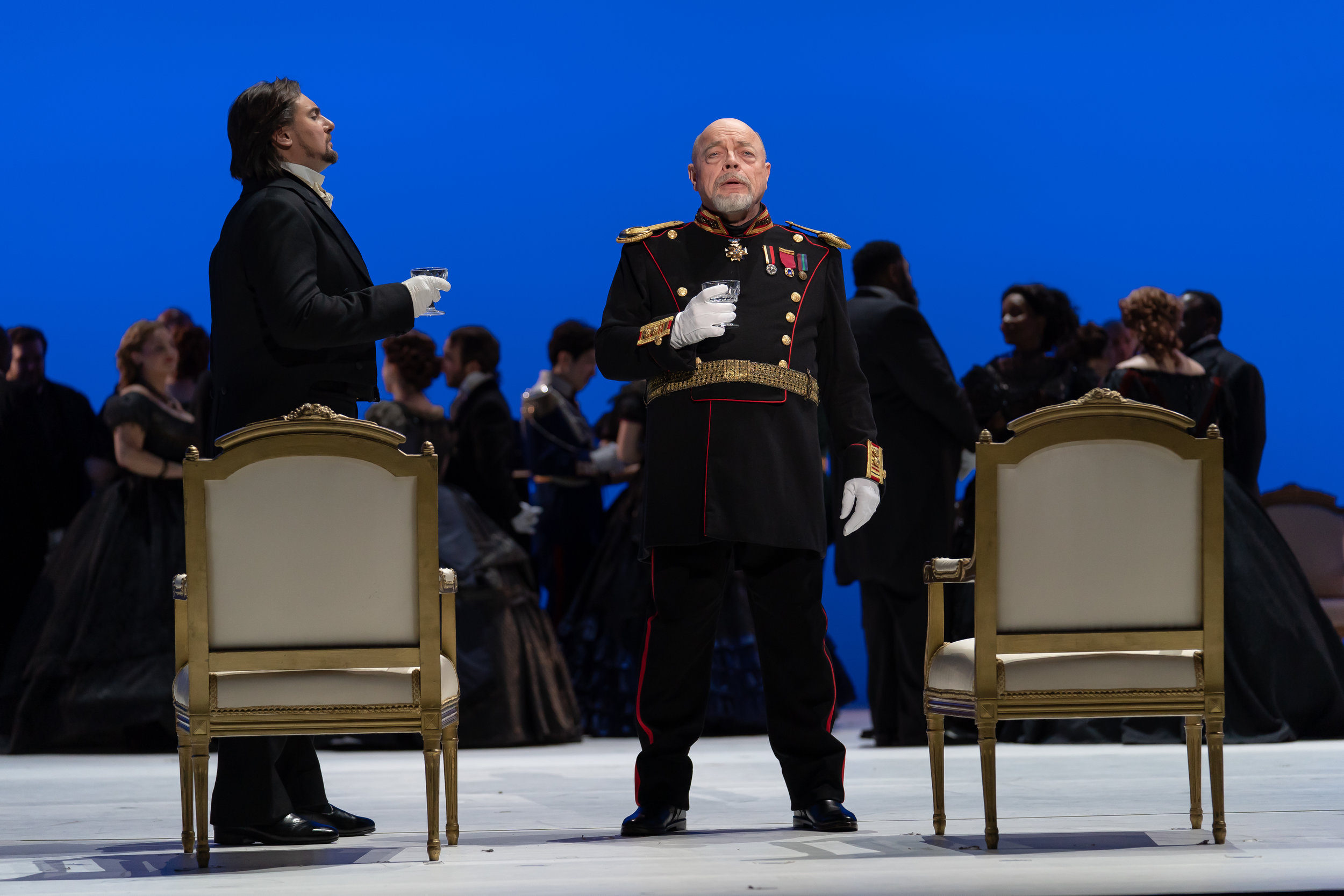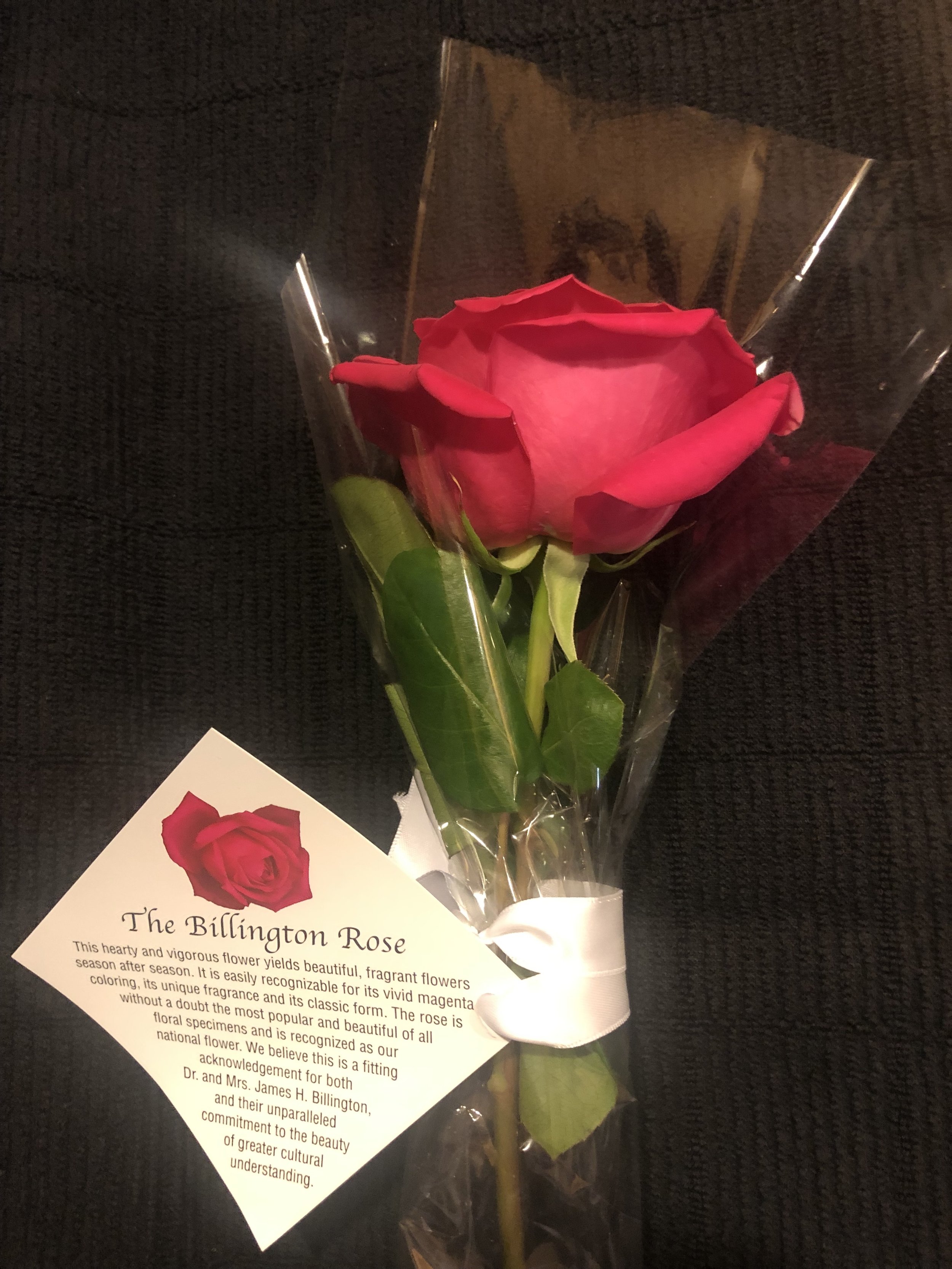I’ve got a problem with this one. I wanted drama; I feel like I got theater. The set threw me off at the very beginning. I liked the new stagings of Aida, Madame Butterfly, and La Traviata that Washington National Opera has brought to DC in recent years. However, the part of me that likes innovative stagings of classic operas and the part of me that likes traditional stagings of classic operas agree on the staging for WNO’s production of Pyotr Illyich Tchaikovsky’s Eugne Onegin (Yevgeny Onegin, 1879): We don’t like it, the staging that is, primarily the set…but then, as the saying goes, who are we to disagree with millions of others. I can point you to a number of reviews of this production over the years and of Saturday night’s performance (see the side bar) that praise the staging.
Two views of the letter-writing scene with Anna Nechaeva as Tatiana. Photo by Scott Suchman; courtesy of Washington National Opera.
I love the opera itself; I like the individual performances, the music, the singing, the acting (mostly), the perfect mid-nineteenth century costumes. I like that the Russian headliners live up to advance notice and that there are some other standout performances. However, the scenes are mostly centered in a large box, three blank walls - two sides and a back, lavishly painted with colored light and sometimes seen through a scrim. The staging is creative and artsy, and what happens in the each scene is well directed, presenting the story in a straightforward manner. The intended effect is to focus attention on the unfolding relationships. Putting the scene in a box will do that for puppet shows at home, but we have different expectations of a stage. Video directors use close ups to focus attention. However, with closeups you only see the closeup. In the Opera House what you see is a small grouping in the middle of a very large box, bathed in light. The box is pretty, but it is still a box. One can make the argument that the lights add to the romantic lyricism, but only if you can avoid thinking about it. The minimalist staging intends an intimacy that I feel is lost beyond perhaps the first few rows, and most importantly, the staging itself draws attention away from the drama. For example, the new staging I liked best was using a scrim for the duel scene imparting a hazy blue, early morning appearance to the scene; however, my attention was split between marveling at the novel appearance and being drawn into the emotional tension unfolding. This production was created by the Canadian Opera Company and has been used by the Metropolitan Opera, beginning in 1997. One famous Met opera using this production was in 2007, starring Renée Fleming and Dimitri Hvorostovsky. It drew glowing reviews, but hey, it starred Fleming and Hvorostovsky. (You can compare the two stagings at home. Take a look at the 2007 video, available for streaming from Met Opera On Demand for about $15, and notice the use of close ups. Also take a look at the 2017 Met Onegin, a production with different staging, starring Anna Netrebko and Mariusz Kwiecień. Which do you prefer? They are no substitute for a live performance, but they will give you the idea).
The duel scene in Eugene Onegin. Photo by Scott Suchman; courtesy of Washington National Opera.
I love the story of Eugene Onegin. Unlike a lot of the classical repetoire, I can connect with its emotionality. The opera is taken, sometimes verbatim, from Alexander Pushkin’s novel of the same name written in verse and published in serial form between 1825 and 1832. In its time it was the most beloved work of literature by the Russian people and is still treasured; Pushkin is considered the Russian Shakespeare. Tchaikovsky showed courage in using this novel for his opera, a lot to live up to. -Spoiler alert- A young Russian country girl, Tatiana, falls in love with an aristocratic neighbor, Onegin, introduced to her by her sister Olga’s fiancé, Lensky. Overcome by her passion, Tatiana sends a letter to Onegin declaring her feelings. Onegin rejects her advance, keeping with his nature by acting honorably but also in a condescending manner; Tatiana is crushed. At a party, Onegin starts paying attention to Olga and she responds to his flirtation. He only wants to distance himself from Tatiana and to irk Lensky, but he takes it too far. Lensky, inflamed by jealousy, challenges him to a duel and is killed. Onegin is distraught and wanders aimlessly for five years until he accidentally encounters Tatiana at a ball in St. Petersburg; she is now a sophisticate married to a Prince. Onegin realizes he is in love with her and pleads his case. She questions whether his interest is due to her new status. She finally admits she still loves him, but she declares that she will remain faithful to her husband, leaving Onegin alone and disconsolate.
This is powerful stuff and deserving of a focus on the feelings. The letter writing scene, Tatiana’s humiliation by Onegin, Lensky’s reflections before the duel, and Onegin’s final pleas are some of the most emotionally charged scenes in all of opera. There is a back story here as well. While working on the opera, Tchaikovsky got a letter from a fan declaring her love for him. He married the fan, but the marriage quickly fell apart, probably because Tchaikovsky was gay and had married her to dispel talk about his sexuality. He went abroad and finished the opera. The opera was a new style for Russian opera at the time, transitioning from romanticism to realism. I have read that Pushkin wanted to emphasize the cultural clash between country provincials and city sophisticates, whereas Tchaikovsky wanted to focus on the emotional devastation caused by this class conflict, perhaps spurred on by the abuse he suffered from being gay. Tchaikovsky feared that opera houses would make the performances too theatrical, obscuring his focus on feelings. In fact, he called the work “lyrical scenes”, not opera, and tried out an early version using students rather than professional opera singers. It is to this production’s credit that its goal was to support the composer’s vision; I just think it misses the mark.
left: Lindsay Ammann as Olga and Alexy Dolgov as Lensky. middle: Victoria Livengood as Filippyevna and Elena Zaremba as Madame Larina. right: Igor Golovatenko as Onegin and Eric Halfvarson as Gremin. Photos by Scott Suchman; courtesy of Washington National Opera.
Okay – what did I like? Just about everything else, and if you like or don’t mind the staging, I think you will find this one quite satisfying overall. WNO brought in two singers from the Bolshoi for this production, known in Europe, but making their debut in the U.S. Let’s start with Anna Nechaeva, the Russian soprano who plays Tatiana; she has a lovely, strong soprano voice, and sings and acts marvelously. Her letter scene was touching, as it should be. I know someone who will only go to Eugene Onegin performances when the main roles are sung by Russians because of the language challenges. I have no doubt he is pleased with Ms. Nechaeva; I was. WNO should get her name on another contract quickly. Russian baritone Igor Golovatenko was also excellent as Onegin. His acting early on is a little too stoic, but the man has a voice – wow! He first came alive with his acting at the party where he regretted having pushed Lensky too far. Tenor Alexy Dolgov, also from Russia though performing in the U.S. for many years, gave me the surprise of the night. At first, I thought his voice and singing were just okay, but when he sang the aria asking where his youth had gone just before the duel, I was enraptured, a perfect combination of voice and emotion, maybe the best single aria of the night. Mezzo-soprano Lindsay Ammann, who has appeared in other WNO productions, gave us a light and flirtatious Olga.
The supporting cast was also excellent; four I will mention. Mezzo-soprano Elena Zaremba who played the girls’ mother, Madame Larina and mezzo-soprano Victoria Livengood who played Tatiana’s nurse were both pleasures; Ms. Livengood especially stood out. Tenor Joshua Blue, a Domingo-Cafritz young artist, gave us an amusing Monsieur Triquet who composed and sang couplets at Tatiana’s party. Base Eric Halfvarson who previously appeared in WNO’s Ring played Prince Gremin. His aria about Tatiana and love later in life was touching and could have been the basis for the sequel if Tchaikovsky had been so inclined.
The closing scene of Eugene Onegin as Tatiana played by Anna Nechaeva refuses Onegin as played by Igor Golovatenko. Photo by Scott Suchman; courtesy of Washington National Opera.
Tchaikovsky’s music is melodic, lush, and glorius. I have had Tatiana’s theme stuck in my head since first I heard it years ago. The orchestra under Conductor Robert Trevino brings the score to life in able support of the singers and drama, only a little uneven at times. The chorus under Chorus Master Steven Gathman sounded fine. I will say though that for the first time at an opera I thought the chorus and supernumeraries might have been excessive in number. As an aside, I don’t usually hear music in one work that reminds me of another composer, but I thought I detected Mozart in Olga and Tatiana’s opening duet and detected Verdi in the opening of the last act.
Let me add one more comment in closing. The productions of this opera seems to be driven by star power. I’d love to see a performance by the Domingo-Cafritz Young Artists (unfortunately one is not scheduled), but in a smaller venue and do away with the box, just surround the scene at play with darkness. I think a more intimate setting, maybe the Terrace Theater, might be a better venue to get the full emotional impact of Pushkin/Tchaikovsky’s work. I wish Tchaikovsky could speak.
The Billington Rose I received as an audience member at the opening performance of WNO’s Eugene Onegin. Photo by author.
The Fan Experience: Adding to the romanticism of the evening was a rose given to each audience member of the opening performance by the Billington family as we departed in honor of the legacy of Dr. James Billington who was the Librarian of Congress from 1987-2015. The Billington Rose is the National Flower. I especially appreciated the acknowledgement on the tag for Dr. and Mrs. Billington, supporters of WNO, that speaks of their “commitment to the beauty of greater cultural understanding.” Let us all be committed to that.
WNO has five more performances of Eugene Onegin scheduled, March 17, 20, 23, 25, and 29. I enjoyed the informative pre-opera talk by Administrator in Artistic Planning Colin Brush and recommend it. Also note that performances of Faust begin on Saturday, March 16.

